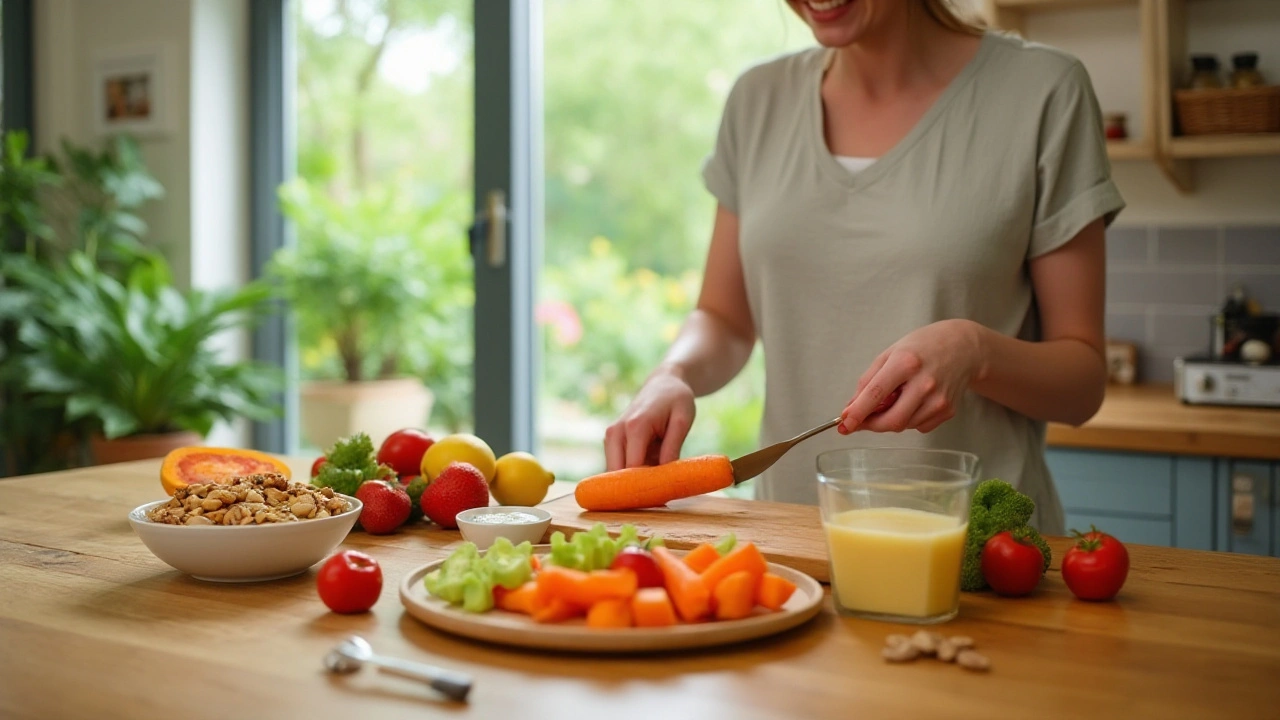Snacking often gets a bad rap, but it can be a powerful tool on your path to better health when done right. Choosing the right snacks can help maintain your energy levels and provide essential nutrients throughout the day.
Why is snacking important? It's not just about curbing hunger but about fueling your body efficiently. A good snack replenishes nutrients and keeps your metabolism humming.
- Why Snacking Matters
- Nutrient-Packed Choices
- Homemade vs. Store-Bought
- Timing and Portion Control
- Creative Snack Ideas
- Making it a Habit
Why Snacking Matters
When it comes to your wellness journey, the idea of snacking might feel contradictory, especially with the common association of snacks with unhealthy choices. However, healthy snacks are indispensable for maintaining a balanced diet and achieving optimal health. First and foremost, snacking helps regulate your metabolism. Eating small amounts throughout the day, rather than having large gaps between meals, keeps your metabolism active and prevents it from slowing down. This steady burn of calories ensures that you have consistent energy levels.
Another crucial benefit of healthy snacking is hunger management. Skipping meals or waiting too long to eat can lead to overeating later—healthy snacks bridge this gap. By including nutritious snacks in your day, you can prevent the kind of hunger that leads to poor food choices. Imagine this: you have a bowl of mixed nuts in the afternoon instead of a bag of crisps. The protein and healthy fats in the nuts keep you full longer and provide sustained energy.
Healthy snacks also play a role in nutrient intake. Many of us struggle to meet our daily vitamin and mineral needs through three meals alone, especially when life gets hectic. Snacking allows you to include more nutrient-dense foods in your diet. Think about munching on carrot sticks, which are rich in beta-carotene and vitamin K. It’s like giving your body small but frequent deposits of the essential nutrients it craves.
For those engaged in physical activities or sports, snacking becomes even more important. Your body needs extra fuel to power through workouts and recover afterward. A well-chosen snack—like a banana or a smoothie packed with greens—can make a significant difference in your performance and recovery. You wouldn't believe the energy boost from a simple, properly-timed snack.
Moreover, snacks can enhance your mental clarity and focus. Ever notice how hard it can be to stay productive when you’re hungry? It's because your brain, like any other organ, needs fuel to function. Healthy snacks supply glucose, which is essential for brain activity. By keeping your blood sugar levels stable, you can maintain your focus and productivity throughout the day.
As registered dietitian nutritionist Karen Ansel explains, “Healthy snacking helps to balance out your blood sugar levels and avoid those afternoon slumps, which can be managed with the right food choices.”Snacking wisely also aids in weight management. Studies show that people who snack on healthy options are more likely to maintain a healthy weight or achieve their weight loss goals. This is because small, nutrient-dense snacks prevent the kind of extreme hunger that encourages overeating later. It’s all about making smart choices that support your body.
Interestingly, snacking can even improve your mood. Foods like dark chocolate and nuts are known to boost serotonin production, the hormone responsible for happiness. By reaching for healthier options, you're not just feeding your body but nourishing your mind. Take a trail mix with dark chocolate chips; it’s a delightful and mood-lifting way to snack.
So, the next time you feel a craving coming on, don’t shy away from snacking. Embrace it as an opportunity to nourish your body and support your wellness journey. With the right choices, snacks can be your allies in achieving and maintaining health, energy, and well-being.
Nutrient-Packed Choices
When diving into the realm of healthy snacks, it's essential to focus on those that are rich in nutrients. These snacks not only satisfy your hunger but also contribute significantly to your daily vitamin and mineral intake. Foods brimming with nutrients are important for maintaining energy levels, supporting mental clarity, and keeping your body's systems running smoothly.
One compelling choice is nuts. Almonds, walnuts, and cashews are packed with protein, fiber, and healthy fats. They're incredibly filling and can be a perfect middle-of-the-day snack. For example, a small handful of almonds can provide long-lasting energy and help keep cravings at bay.
Fruits make for another excellent snacking option. Apples, berries, and oranges are not just delicious but also rich in vitamins like Vitamin C and antioxidants. Antioxidants are crucial for fighting off free radicals, potentially reducing the risk of chronic diseases. Pairing fruits with a small amount of protein like yogurt or cottage cheese can create a balanced snack that curbs hunger effectively.
Vegetable sticks with hummus or guacamole are also great choices. Veggies like carrots, celery, and bell peppers are low in calories but high in essential nutrients such as vitamins A and K. Combined with the healthy fats and protein in hummus or guacamole, this snack is not just filling but also incredibly nutritious.
Superfood Snacks
Another fantastic option involves incorporating superfoods into your snacks. These foods are densely packed with nutrients and provide various health benefits. Chia seeds, for example, are high in fiber and omega-3 fatty acids. You can easily add them to a smoothie or a bowl of yogurt for an instant nutrient boost.
Edamame is another superfood snack worth mentioning. These young soybeans are a powerhouse of protein, fiber, and essential vitamins and minerals. Steamed edamame sprinkled with a little sea salt can be both satisfying and nutritious.
According to nutritionist Joy Bauer, "Healthy snacks can be a great asset for people who want to lose weight or maintain a healthy lifestyle. The key is to choose snacks that are nutrient-dense and portion-controlled."
Including seeds like pumpkin, sunflower, and flax seeds can also round out a healthy diet. These seeds are packed with protein, healthy fats, and numerous vitamins and minerals, making them a versatile ingredient you can add to virtually any snack.
Whole Grains and Protein-rich Snacks
Don't forget about whole grains. Snacks like whole-grain crackers, oatmeal, or even air-popped popcorn can be highly nutritious. Whole grains are rich in fiber, aiding in digestion and keeping you full for longer periods. Pairing whole grains with a protein source like cheese or a boiled egg can make your snack even more effective at curbing hunger.
Greek yogurt is another nutrient-packed snack that cannot be ignored. It's creamy, delicious, and rich in protein. Adding some fruit or a handful of nuts can make it a balanced and satisfying snack that will keep you energized throughout the day.
Even something as simple as a protein bar can be a good choice, especially if you're on the go. While choosing a protein bar, ensure it has minimal added sugars and artificial ingredients to keep it as healthy as possible.
By incorporating these nutritious eating habits into your daily routine, you'll find that you have more energy, better focus, and an overall improvement in your wellbeing. The key is to choose a variety of nutrient-dense foods that you enjoy, making it easier to stick to your wellness journey.

Homemade vs. Store-Bought
When it comes to choosing between homemade snacks and store-bought options, many factors come into play. Homemade snacks give you the benefit of knowing exactly what goes into your food. You control the ingredients, avoiding unnecessary additives, preservatives, and high levels of sugar or salt that are often found in commercial products.
Store-bought snacks offer convenience, but this often comes at a cost. Many packaged snacks are designed to be shelf-stable, which frequently means compromising on nutritional value. Pre-packaged snacks are notorious for their high levels of unhealthy fats, sugars, and sodium. Checking ingredient labels and nutritional information becomes essential if you opt for store-bought options.
Homemade snacks usually require a bit of time and effort, but investing in meal prepping can make it simpler. Preparing large batches ahead of time means you always have a healthy snack on hand. From energy balls to fruit and nut bars, the variety of homemade options is endless, and many recipes require minimal ingredients and effort. Try making a batch of homemade granola using oats, honey, and dried fruits. This way, you know it’s packed with wholesome ingredients.
Nutritious eating is a cornerstone of a healthy lifestyle, and homemade snacks can be tailored to fit your dietary needs and preferences. Whether it's tailoring snacks to be gluten-free, vegan, or high in protein, having control over the ingredients ensures you're fueling your body with what it truly needs. Not to mention, homemade options eliminate the environmental impact of packaging waste.
According to a study published in the Journal of Nutrition, consuming homemade food is associated with a healthier diet and a lower risk of developing chronic conditions.
The cost factor is also noteworthy. While some might think homemade snacks are expensive, they often turn out to be more cost-effective in the long run. Buying ingredients in bulk and making your own snacks can save money while providing superior nutritional benefits. On the other hand, the convenience factor of store-bought snacks cannot be denied, making it an appealing option for those with very tight schedules.
When choosing store-bought snacks, look for items with minimal ingredients and transparent labeling. Options like air-popped popcorn, unsweetened dried fruits, and nut butters without added oils or sugars can be good choices. These provide a balance of convenience and nutrition without the downsides of highly processed snacks.
In conclusion, both homemade and store-bought snacks have their pros and cons. Homemade snacks give you complete control over your nutrition and can be made to suit specific dietary needs. Store-bought snacks offer unbeatable convenience for those short on time. The best approach may be a combination of both, prioritizing homemade options when possible but having healthy store-bought choices on hand for busy days.
Timing and Portion Control
Knowing when and how much to eat is just as crucial as choosing the right foods. Consistent timing can help regulate your metabolism and keep your energy levels stable throughout the day. Experts recommend not letting more than four hours pass between meals and snacks. This prevents drastic dips in blood sugar, which can lead to energy crashes and overeating during meals.
Paying attention to portion sizes is also key. Healthy snacks are meant to complement your meals, not replace them. A good rule of thumb is to keep snacks between 150-200 calories. This amount is generally sufficient to curb hunger without loading up on excess calories. Portion control helps you avoid that overly full, sluggish feeling and keeps your energy levels balanced.
It's helpful to pair proteins and fibers in your snacks. Proteins such as nuts, seeds, or a piece of cheese paired with fiber-rich options like fruits or whole grains can provide lasting energy and keep you fuller for longer. This combination helps in regulating the release of sugar into the bloodstream, providing a steady source of energy.
"Paying attention to the size and timing of your snacks can make a huge difference in how you feel throughout the day," says registered dietitian Jane Smith. "It's not just what you eat, but when you eat and how much you eat that matters."
| Snack Type | Recommended Portion |
|---|---|
| Nuts | 1 oz (about 22 almonds) |
| Fruit | One medium apple |
| Yogurt | 1 small container (6 oz) |
| Whole grain crackers | 6 crackers |
Another important tip is to avoid snacking mindlessly. Many of us tend to snack while watching TV or working at our desks. This can lead to overeating because we lose track of how much we're consuming. Instead, take the time to sit down and enjoy your snack without distractions. This mindful eating practice can enhance your overall enjoyment of food and help you recognize when you're truly satisfied.
A great way to practice portion control is by pre-portioning your snacks. Instead of eating directly from a large container, divide snack items into individual portions as soon as you bring them home from the store. This makes it easier to grab a single serving when you're hungry, reducing the temptation to overeat.

Creative Snack Ideas
When you think about snacks, what comes to mind? Often, people revert to the familiar – crisps, chocolate bars, maybe even the occasional fruit. But incorporating healthy snacks into your daily routine doesn't have to be dull or repetitive. With a little creativity, you can turn your snack time into an enjoyable and nutritious part of your day.
One ingenious idea is to create your own trail mix. Instead of purchasing pre-packaged options, opt for a mix of nuts, seeds, and dried fruit. Nuts like almonds and walnuts provide healthy fats and protein. Seeds, such as chia or pumpkin, add a dose of essential minerals. Dried fruits like apricots and cranberries offer natural sweetness without added sugars. By mixing these together, you get a balanced snack that's both tasty and filling.
Another fun and nutritional option is veggie sticks with hummus. Swap out your usual crisps for crunchy carrot sticks, cucumber slices, or bell pepper strips. Pair them with a homemade hummus dip, which you can easily whip up using chickpeas, tahini, lemon juice, and olive oil. This combination provides fiber, vitamins, and proteins, keeping you full and satisfied.
Homemade granola bars are another excellent choice for a nutritious eating routine. You can control what goes into them, ensuring they are free from artificial additives and excess sugar. A simple recipe might include rolled oats, honey or maple syrup, and a handful of nuts and seeds. Bake them until golden brown, let them cool, and you've got a portable, healthy snack.
Fruit and yogurt parfaits can be a delightful treat that's also good for your gut. Layer some Greek yogurt with fresh berries, a sprinkle of granola, and a drizzle of honey. Not only does this provide probiotics for a healthy digestive system, but the berries add antioxidants, and the granola offers fiber.
If you're in the mood for something a bit more indulgent yet still healthy, try making your own energy balls. Use dates as a base, blending them with nuts, cocoa powder, and a hint of vanilla extract. Roll the mixture into bite-sized balls, and you have a perfect sweet snack packed with nutrients.
According to nutritionist Dr. Sarah Brewer, "Choosing the right snacks can help maintain your energy levels and provide essential nutrients, making a significant impact on your overall health."
Even something as simple as apple slices with peanut butter is an excellent snack that balances carbs, proteins, and fats. The apple provides vitamins and fiber, while the peanut butter delivers a dose of protein and healthy fats to keep you energized.
To make your snacks more exciting, try thinking outside the box with smoothie bowls. Blend your favorite fruits with some Greek yogurt or plant-based milk, pour it into a bowl, and top with nuts, seeds, and a bit of granola for texture. It's like eating a dessert, but it's entirely beneficial for your health.
Finally, don't forget the power of edamame. These young soybeans can be quickly steamed and sprinkled with a bit of sea salt for a savory, protein-packed snack. They're especially great if you're looking for a plant-based option.
Making it a Habit
Incorporating healthy snacks into your daily routine can be a game-changer for your wellness journey. It's not just about occasional bites of fruit or nuts; it's about creating a consistent habit that seamlessly fits into your lifestyle. Consistency is key to any successful health endeavor, and snacking is no exception.
First, set a specific time for snacking. This could be mid-morning or mid-afternoon, times when energy levels tend to dip. By establishing a regular snack time, you help your body adjust to this new eating pattern, making it a natural part of your day. Over time, you'll find that your body starts to expect and depend on these healthy bursts of energy.
"Healthy snacking is not just about staving off hunger; it's about nourishing your body with nutrient-dense foods," says Dr. Sara Bleich, a professor of Public Health at Harvard.Next, make your snacks easily accessible. This means having them pre-prepared and within arm's reach. Keep a bowl of fresh fruit on your kitchen counter and a stash of mixed nuts or granola bars in your desk drawer at work. Convenience is crucial; if your healthy snack is easier to grab than a bag of chips, you'll be more likely to choose the healthier option.
Variety is another important factor. Eating the same snacks every day can get monotonous, leading to cravings for less healthy options. Mix it up by incorporating a range of snacks rich in different nutrients. Consider homemade trail mix one day, yogurt with berries the next, and perhaps some carrot sticks with hummus after that. Each of these snacks offers a unique combination of proteins, fats, and carbohydrates, which can help keep your energy levels stable and your palate interested.
Planning ahead can make a big difference. Take a few minutes at the start of the week to portion out your snacks into individual servings. This can help manage your portions and ensure you always have a healthy option on hand. Consider investing in reusable containers or snack-sized baggies for this purpose. When your snacks are pre-packaged and ready to go, you're less likely to make impulsive, less healthy choices.
Being mindful while you snack is beneficial too. Avoid eating on the go whenever possible and instead, take a few moments to sit down and enjoy your snack. This can enhance digestion and help you tune in to your body's hunger cues, preventing overeating later. Mindfulness can turn even a simple snack into a nourishing ritual.
Finally, listen to your body. Pay attention to how different snacks make you feel. Do you feel energetic and satisfied, or do you find yourself hungry again shortly after? Use this feedback to fine-tune your snack choices over time. Your body knows what it needs; it's all about tuning in and responding appropriately.
By making nutritious eating a regular part of your daily routine, you're not only supporting your physical health but also setting yourself up for long-term wellness. Healthy snacking is more than just a dietary choice; it's a lifestyle change that can have lasting benefits.






